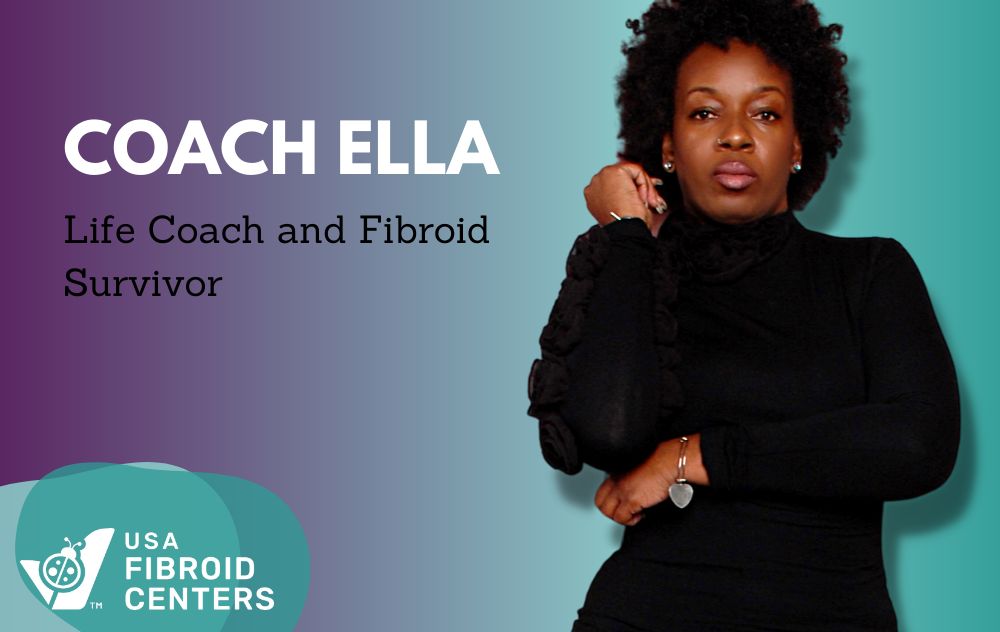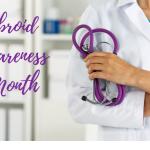
When you’re a teenager in high school, you have certain worries. There’s passing your classes, who you’re going to prom with, if you can attend the homecoming game, wondering how well your outfit will impress your crush, and figuring out what to eat before lunchtime.
When Coach Ella, a life coach, was in high school that was not the case. Coach Ella was passing out in her classes, dealing with periods so heavy she would go through two to three tampons and pads at a time, and constantly going to her doctors to figure out why this was happening to her.
Now a life coach with her published book, “There Is Nothing Wrong with Saying So What!!”, she’s still dealing with the aftereffects of having fibroids.
COACH ELLA’S STORY
Coach Ella’s story starts early, when Coach Ella was diagnosed with fibroids at the age of 17. Women are typically diagnosed in their early 20s to 30s, and about 70 to 80% of women are affected by fibroids by the age of 50. After describing her symptoms to her physician, Coach Ella was told she was anemic, and was prescribed up to three iron pills a day.
Even though she was taking medication to manage her iron deficiency, she still needed to get blood transfusions because she lost so much blood due to her fibroids. Coach Ella said she felt panicked and constantly worried about receiving transfusions. “I didn’t want someone else’s blood inside of me. What’s going to happen to me? What does this person have inside them?” These concerns that were in the back of her mind and wouldn’t subside.
During Coach Ella’s experience with fibroids, she kept everything a secret from her friends because, “It was embarrassing.” She adds, “I was missing a lot of school during the time I had my cycle, so I didn’t really talk about it.” This internal struggle made Coach Ella feel closed off from family and friends. Self-esteem issues can be a perpetual battle for young women. Fibroids can make, these feelings of inadequacy can be even worse.
Later when she was diagnosed, her doctor told her the size of Coach Ella’s fibroids were large. During her high school experience before she knew what was happening to her, Coach Ella dealt gave her the symptom of an extended, bloated midsection resembling weight gain.
Coach Ella became pregnant when she was 17. She had her first child, a daughter, before she was diagnosed with fibroids. When she got pregnant with her older son, she knew she had fibroids, but she held off until she had her younger son before looking into treatment. During pregnancy, the fibroids made the normal changes in her body more of a hardship, adding additional symptoms like anemia, bad cramps, pain during sex, and frequent urination.
Due to her agonizing symptoms, difficult pregnancies, and countless transfusions, Coach Ella finally decided to look into treatment options. When she approached her doctor about getting fibroid treatment, the only choice given was a hysterectomy. She didn’t know about a safer, more effective option: Uterine Fibroid Embolization (UFE).
Given only one course of action, Coach Ella felt a hysterectomy was her only option for treatment. A few months post-surgery, she still felt bloated and constipated She went about her daily life until she found herself in an ER vomiting on the floor. The medical staff told her, “You need to have surgery within the next 30 minutes, or else you’re not going to make it.” Coach Ella ended up spending a week on life support.
At the time, Coach Ella had no idea that she was experiencing complications from her hysterectomy. During her surgery, the surgeon accidentally nicked her intestine, which led to severe bloating and her bowels being backed up. Eventually, Coach Ella’s her intestinal issues poisoned her entire body, and she was forced to go back to the ER. As she was rushed to surgery, she didn’t know if she would make it. Her mind was filled with panic and fear, wondering what would happen to her children if she didn’t survive. After the surgery, she was physically unrecognizable; her skin had gotten darker, and she truly looked nothing like herself. Coach Ella confirms, “That was a tough time.”
Unfortunately, the heartbreak didn’t stop there. The doctors and nurses had told Coach Ella’s parents not one, not two, but three times that she didn’t make it. Coach Ella was, unfortunately, at death’s door multiple times. It’s terrifying to consider that she was only 27 years old and had been put through so much for her age. Her hysterectomy caused more complications, such as hernias which needed even more surgeries to repair. In addition to everything Coach Ella endured, her navel was removed completely leaving her with a scar from hip to hip, resembling she had been cut in half. Because of the tissue and nerve damage in her stomach, she can no longer feel anything in her abdomen.
THERE IS HOPE
Age, ethnic origin, obesity, and family history can all increase the likelihood of fibroids. Fibroids are a condition that impact not only all women, but particularly those of African American descent as about 80 to 90% of black women are diagnosed with fibroids and they tend to develop fibroids at a younger age.
Fibroid development can often be influenced by your genes. Coach Ella was aware that fibroids ran on both sides of her family. Coach Ella’s cousin had fibroids and had opted for a hysterectomy, but her family didn’t have an open conversation about her experience. Her cousin was never able to have kids and any discussion about it was taboo. “What goes on in my house, stays in my house. It was one of those types of things,” Coach Ella recalled. Despite fibroids being one of the most common reproductive conditions in the world, there’s a large social stigma due to a lack of conversation. Women are not properly educated about their bodies, which leads to women feeling as if they can’t ask questions freely. Even Coach Ella says, “I didn’t start talking about [my fibroids] until I got older.”
Coach Ella shares, “It’s so important to have a conversation, to break generational curses, and to have a safe place for young women to have a conversation. It’s okay. I went through what you’re going through. You don’t have to feel bad about having a heavy cycle.”
Fibroids are not something that is one size fits all; they can be symptomatic, or non-symptomatic, painful, or painless. It materializes in each body in a different way, which is why it’s important to speak up about experiences with symptoms and treatment. Coach Ella shares, “It’s okay. Let’s make other women aware you can have children; you can have a life after this. It’s so important to have these conversations.” USA Fibroid Centers has created an easy way to share your stories, ask your questions, and read about other women having similar experiences with having fibroids. Learning from other fibroid survivors can help spread awareness as well as attention to the fibroid epidemic impacting women today.
Coach Ella has some simple advice for women, “Check in. See if you have fibroids because I don’t want anyone to go through what I did. It was tough, both physically and mentally.” Not only was the physical pain hard, but the monthly visits to the doctors and hospitals took a mental toll on Coach Ella. Despite what she went through, she has a few last words of encouragement to anyone concerned about fibroids: “There is hope, we are fibroid fighters, and we will win this together.”
Everything Coach Ella endured was due to a botched hysterectomy and the early diagnosis of fibroids. The fact is that 44% of women diagnosed with fibroids are only given surgical options, and 62% of women have never even heard of minimally invasive treatments like UFE. This is an effective fibroid treatment that allows women to live without the pain and discomfort of fibroid symptoms, giving women the freedom to recover at home and avoid surgery risks. When women are educated about their options, they can choose the treatment path that fits their individual needs.
CONTACT USA FIBROID CENTERS
As Coach Ella states time and time again, it’s okay. There are other solutions to fibroids, and USA Fibroid Centers has lots of resources to help you. Take the symptom quiz if you think you have fibroids, and contact us with any questions you may have about your symptoms. Contact one of our experienced fibroid specialists if you want more information about fibroid treatment; we provide both in-office and virtual consultations, so schedule one online today.
- Bergquist, A. (2020, August 18). 7 Things to Know About Living with Fibroids. Health & Wellness Topics, Health Tips & Disease Prevention. https://healthblog.uofmhealth.org/womens-health/7-things-to-know-about-living-fibroids.
- Eisinger, S. (2019, April). Uterine fibroids. Office on Women’s Health. https://www.womenshealth.gov/a-z-topics/uterine-fibroids#:~:text=Why%20should%20women%20know%20about,their%2040s%20and%20early%2050s.



